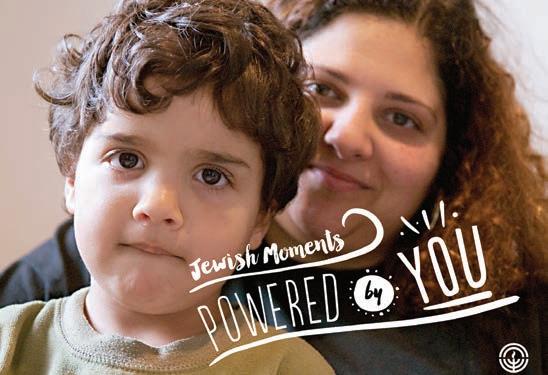
10 minute read
FOUNDATION
By Robert Nomberg president & ceo richmond jewish foundation
The year 2020 has been a tumultuous year to say the least. As you work with your financial advisors to discuss year-end tax and charitable planning, there are several additional factors this year that can influence key decisions.
The COVID-19 pandemic continues to impact virtually all aspects of the economy; and the election is bound to bring changes to Washington that could result in significant changes to the income tax and the estate and gift tax regimes. States and local governments are facing unprecedented budget crises that could also lead to new or larger tax burdens.
While the outcome of the election will greatly impact the direction that tax policy will take in the coming years, it is also important to realize that regardless of the outcome of the election: the economy will most likely still be in a recession and this will make it even more di cult to raise su cient revenue to support government spending and shore up key social safety net programs such as Social Security, Medicare, and Medicaid.
Di ering tax agendas could bring significant changes either way: There are significant di erences between the two presidential candidates. The Trump tax plan for the second term revolves around making permanent several key provisions of the Tax Cuts and Jobs Act of 2017 as well as a potential cut in the tax rate on capital gains and dividends. The Biden tax agenda contemplates reimposing a top income tax rate of 39.6 percent above $400,000 and taxing capital gains and dividends at ordinary income tax rates for those taxpayers with incomes over $1 million.
Some key considerations for yearend decisions include:
Tax rate considerations and the impact of recently-enacted
legislation: The prospect of increased tax rates in 2021 could lead some to second-guess the tried and true year-end planning mantra of “deferring income and accelerating deductions” as a means to reduce the current year’s tax bill. E ective tax rates and the value of deductions could be worth more in 2021 if Congress does impose a tax increase next year. However, recently-enacted tax legislation, as well as some other long-standing planning techniques could be beneficial in 2020.
Planning idea: The CARES Act enacted to provide COVID-19 relief contains a provision that enables the current deduction of up to 100 percent of adjusted gross income for cash gifts to charity (other than donor-advised funds, supporting organizations, and private foundations). Individuals considering large cash donations may find this one-year lifting of the AGI limitation to be beneficial. And the IRA charitable rollover remains an attractive alternative to those over age 70½ who may not otherwise
be able to itemize their deductions and claim a tax benefit from a charitable contribution. Keep in mind that Congress has suspended the pension rules imposing “required minimum distribution” requirements but rollover contributions to qualified charities could still make sense for some.
Taxes on capital gains could rise
dramatically: Capital gains taxes generally were reduced under the TCJA to 15 percent or 20 percent, depending on a taxpayer’s income level and the asset class. Under a second term of the Trump Administration, the existing structure could remain static or even be reduced. Under the Biden plan, however, taxes on capital gains could almost double to 39.6 percent for taxpayers earning more than $1 million.
Planning idea: With the possibility of a substantial increase in the capital gains tax rate, clients with appreciated assets may want to consider selling before year-end in order to lock in more favorable tax rates or consider donating those appreciated assets to charity to take advantage of the larger deduction based on the fair market value of the asset at the contribution date rather than selling the asset, pay ing capital gains taxes that might be due and then contributing the proceeds. Estate taxes are likely to increase: Under the TCJA, the gift and estate tax exemption has been increased from $5 million to $10 million with inflation adjustments, bringing that amount to $11.58 million for this year. Individuals can gift up to this amount without paying a dollar of tax during their lifetime. Anything left over can be used to o set estate taxes at death.
Planning idea: It may make sense to engage in gift transactions before year-end in order to take advantage of the higher exemption amount. There is another important added benefit of removing any future appreciation from the estate through gifting strategies to f amilymembers and others. There are a number of estate planning techniques that can be utilized including using gifts or sales of property expected to produce income or increase in value to remove existing or future wealth from the traner tax base, use of trusts for the donor’s spouse, setting up grantor retained annuity trusts, among others. In addition, consideration of transfer ring assets to charities now, rather than later, through charity lead annuity trusts may also be advantageous.
Cost basis step-up of bequeathed assets may be elimi-
nated: Under current law, heirs receive appreciated assets with a step-up in basis to fair market value at the time of death. The Biden plan proposed to eliminate this rule, making transfers at death taxable. And this “taxable recognition event” would occur even if the beneficiaries do not sell the asset. Changes contemplated by the Biden plan would (1) decrease the gift and estate tax exemption substantially: (2) increase the tax rate on capital gains; and (3) potentially eliminate the step-up in basis of inherited assets.
Planning ideas: Gifts at death to charity would be exempt from the
Biden plan tax changes. However, donors who are considering making such gifts may also wish to accelerate these transfers in order to provide significant support to charities now, rather than in later years, especially as many charities face increased costs and potential decreases in fundraising during the pandemic. Given this combination, in the event that Vice President Biden wins the election, it may make sense to consider shifting certain assets, especially those likely to continue to appreciate in value to others in lower tax brackets such as younger generations and potentially defer capital gains taxes that might otherwise need to be triggered. As with any and all, significant tax and charitable planning ideas, it is essential to review existing income, estate and charitable giving plans to assure that potential changes are viewed in the context of the client’s complete financial profile. And, please remember that RJF does not provide tax advice. Please consult with your professional advisor before taking any action.
Jewish American Hall of Fame Exhibit at VHM
The Virginia Holocaust Museum continues to welcome in-person visitors daily at the museum.
Come join the over 4,000 visitors who have come to the VHM since it re-opened on July 6.
Samuel Asher, executive director, noted, “We are focusing on our Jewish American Hall of Fame exhibit that has an important section on Justice Ruth Bader Ginsburg (OBM).”
The permanent exhibit includes over 50 Jewish American men and women who have made important contributions in all fields of endeavor have been inducted since 1969. The large artistic plaques have been created by outstanding sculptors, many of whom have won the American Numismatic Society’s J. Sanford Saltus Award for Outstanding Achievement in the Art of the Medal and/or the American Numismatic Association’s Numismatic Art Award for Excellence in Medallic Sculpture.
There are Jewish-American Hall of Fame honorees in Business, Entertainment, Literature, Medicine, Military, Music, Public Service, Religion, Science, Social Welfare, and Sports.
In addition to the famous names, visitors will discover relatively unknowns like Gertrude Elion, whose medical research has saved millions of lives around the world and earned her a Nobel Prize in Medicine; Asser Levy, one of the first Jewish settlers in America, who fought anti-Semitism and sued for the right to bear arms in the citizens’ guards; Ernestine Rose, pioneer fighter for Women’s Rights; and “Rosie” Rosenthal, World War II Flying “Ace”
As people gaze on the portraits of Albert Einstein, George Gershwin, Ruth Bader Ginsburg, Joseph Pulitzer, Dr. Jonas Salk, et al, it is hoped that visitors will reflect on what contributions to humanity might have been made by the six million Jews (and their descendents) whose lives were viciously taken in the Holocaust.
For further information about the JewishAmerican Hall of Fame, visit www.vaholocaust.org/.

Supreme Court Justice Ruth Bader Ginsberg (OBM) is featured in the Jewish American Hall of Fame exhibit at the Virginia Holocaust Museum. The permanent exhibit
includes over 50 Jewish American men and women. VHM photo

Volunteer to help uncover history with us! What did Virginia newspapers report about Nazi persecution during the 1930s and 1940s? In partnership with the U.S. Holocaust Memorial Museum and Hands on Greater Richmond, the Library of Virginia is o ering the last of three virtual “research sprints” into their newspaper collection on Nov. 21 from 10-11:30 a.m. By identifying Holocaustrelated articles in Virginia newspapers, we will begin to understand what the average Virginian could have known during WWII. Minimum age is 16 (12 with an adult). These events are free and registration is required. Register today at www.handsonrva.org/opportunity/a0C1J00000IlL7J?Id=a0C1J00000IlL7J

Calling all middle and high school educators! Together with Yahad-In Unum, VHM is pleased to present “Holocaust by Bullets In the Occupied Soviet Territories” -- a 90-minute, free teacher webinar scheduled for Nov. 7, from 10-11:30 a.m. Register at www.vaholocaust.org/professional-development
MANY THANKS TO OUR 2020 CORPORATE PARTNERS The support of our Corporate Partners during this challenging year has been critical to our success. We extend our deepest thanks for their generosity and commitment to our community.


Jewish Community Federation of Richmond 2020 Corporate Partners:
Emerald Level Sponsor:

Sapphire Level Sponsors:


Gold Level Sponsor:
THESE PARTNERSHIPS ENABLE US TO


Provide life-sustaining humanitarian aid at home and abroad

Build a welcoming and inclusive community and o er resources at every stage of life

Empower older adults to thrive in their homes and community safely and independently

Contributor Level Sponsor:

Educate our community about compelling issues

Donor Level Sponsors:


Connect Jewish young adults with their community and peers



It makes good corporate sense to partner with the Federation. Sponsors are provided with the opportunity to invest in social impact through an organization that evokes recognition and trust throughout the Greater Richmond region. Supporting the Federation will increase your company’s brand awareness, enhance your corporate image and generate good will among the people who count the most—our donors and your clients. If you’d like to learn more about our partnership program, please contact Paul H. Powell, Director, Corporate Partnerships and Business Development at 804.320.0220 (Remote O ce) or ppowell@jewishrichmond.org.






